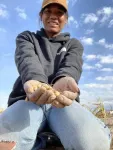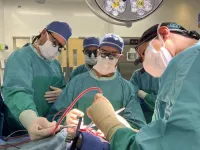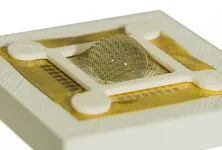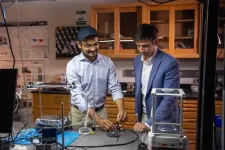(Press-News.org) Wearing a surgical face mask in public spaces reduces the risk of self-reported respiratory symptoms, finds a trial of adults in Norway published by The BMJ today.
The effect was moderate - a 3.2% reduction in symptoms, equivalent to around 3,300 fewer infections per 100,000 people - but the researchers say these results support the claim that face masks may be an effective measure to reduce the rate of self-reported symptoms consistent with respiratory tract infections.
Observational studies suggest that face masks reduce the risk of respiratory tract infections, but findings from randomised trials are inconclusive.
To explore this further, the researchers carried out a randomised controlled trial to evaluate the personal protective effects of wearing versus not wearing surgical face masks in public spaces on self-reported respiratory symptoms over a 14 day period.
Their findings are based on data from 4,575 adults in Norway (average age 51; 61% women) between 10 February 2023 and 27 April 2023, during a normal influenza season in the Nordic countries.
Participants completed an online questionnaire about sociodemographic and lifestyle factors, beliefs about face masks and risk of infection, and face mask use in the two weeks before the study.
Some 2,313 participants were then randomly assigned to wear a disposable surgical face mask when close to people in public spaces (eg, shopping centres, streets, public transport) over 14 days (intervention arm) and 2,262 were asked to remain mask-free when close to people in public spaces (control arm).
Participants were asked to report any symptoms consistent with a respiratory infection, defined as fever and one respiratory symptom (stuffy or runny nose, sore throat, coughing, sneezing, heavy breathing); or one respiratory symptom and at least two other symptoms (body ache, muscular pain, fatigue, reduced appetite, stomach pain, headache, loss of smell).
They were also encouraged to take a covid-19 test when they felt unwell, but the number of participants taking a test was low.
Overall, 163 (8.9%) participants in the intervention arm and 239 (12.2%) in the control arm reported respiratory symptoms - an absolute risk difference of 3.2% in favour of the face mask intervention. However, no statistically significant effect was found on self-reported or registered covid-19 infection between the two arms.
Of 155 participants who reported adverse effects, 80 reported unpleasant comments from other people when wearing a face mask in public spaces and feeling “silly” being the only one wearing a face mask in public. Others (40) said wearing the mask was uncomfortable or tiring because of breathing difficulties, fogging of glasses, and poor fit.
The authors acknowledge that all the data were self-reported and suggest that wearing a face mask may have led participants to avoid public spaces or others to keep a larger social distance.
Environmental concerns associated with face masks (eg, manufacture and transport, emissions, littering, landfill) should also be considered, they add.
Nevertheless, they conclude that wearing a face mask is a simple, relatively low cost, and generally well tolerated intervention and is one of several public health and social measures that may be worth considering for reducing the spread of respiratory infections.
[Ends]
END
Wearing a face mask in public spaces cuts risk of common respiratory symptoms, suggests Norway study
Effect moderate, but could be a useful measure against infections, say researchers
2024-07-25
ELSE PRESS RELEASES FROM THIS DATE:
Some private biobanks overinflating the value of umbilical cord blood banking in marketing to expectant parents
2024-07-25
Some private UK biobanks may be misleading expectant parents about the value of storing umbilical cord blood to treat life-threatening diseases that may arise in their child in the future, reveals an investigation by The BMJ, published today.
Over the past decade growing numbers of parents have chosen to store blood from the umbilical cord, which contains stem cells, in case their infant develops a condition that could be treated with stem cell therapy.
Parents must use a private biobank which charges around £550 ...
New research in fatty liver disease aims to help with early intervention
2024-07-25
A new study brings researchers closer to better understanding the pathology of the fatty liver disease MASH, which stands for metabolic dysfunction-associated steatohepatitis.
MASH is a consequence of poor diet and obesity and results in severe damage to the liver. In MASH, the liver becomes filled with active and rapidly multiplying T cells, which are a type of immune cell.
In today’s study, published in Hepatology, researchers examine what these T cells look like and how they work in people with liver cirrhosis (a late stage of liver disease) and in an animal ...
Genetics reveal ancient trade routes and path to domestication of the Four Corners potato
2024-07-25
A new study shows that a native potato species was brought to southern Utah by Indigenous people in the distant past, adding to an ever-growing list of culturally significant plant species that pre-contact cultures domesticated in the Southwestern U.S.
The team of researchers, led by Red Butte Garden and the Natural History Museum of Utah (NHMU) at the University of Utah, used genetic analysis to reveal how and where tubers of the Four Corners potato (Solanum jamesii) had been collected, transported and traded throughout the Colorado Plateau. The findings support the assertion that the tuber is a “lost sister,” joining maize, beans and squash—commonly ...
SNIS 2024: New study shows critical improvements in treating rare eye cancer in children
2024-07-25
FOR IMMEDIATE RELEASE: July 24, 2024, 3:20 P.M. MDT
CONTACT: Camille Jewell
cjewell@vancomm.com or 202-248-5460
COLORADO SPRINGS, Colo. — The evolution of retinoblastoma treatment over the past 15 years has resulted in a higher likelihood of vision preservation without compromising survival, according to research released today at the Society of NeuroInterventional Surgery’s (SNIS) 21st Annual Meeting.
Retinoblastoma, a rare eye cancer that affects young children, carries a risk of impaired vision and removal ...
Wearable devices can increase health anxiety. Could they adversely affect health?
2024-07-24
Using a wearable device, such as a smart watch, to track health data and symptoms, is supposed to help people monitor their health and address symptoms as quickly as possible to spur positive health outcomes. But for people with atrial fibrillation, also known as Afib, using a wearable device to monitor the heart rate and to alert wearers of an irregular heartbeat might not be as helpful as wearers think.
A new study in the Journal of the American Heart Association, led by Lindsay Rosman, PhD, assistant professor of medicine in the ...
Addressing wounds of war
2024-07-24
Dr. Olga Denysiuk, MD, PhD, is a highly skilled eye surgeon in Ukraine who now finds herself at the frontlines of ophthalmic trauma care caused by war.
“Every day, I am fighting my war in the operating room,” says Denysiuk. “Cases of eye trauma are mounting and it’s critical that we have surgeons trained to delicately manage eyelid and orbital injuries.”
Denysiuk is one of two ocular specialists selected for a unique humanitarian fellowship at the University of Calgary’s ...
Rice researchers develop innovative battery recycling method
2024-07-24
A research team at Rice University led by James Tour, the T.T. and W.F. Chao Professor of Chemistry and professor of materials science and nanoengineering, is tackling the environmental issue of efficiently recycling lithium ion batteries amid their increasing use.
The team has pioneered a new method to extract purified active materials from battery waste as detailed in the journal Nature Communications on July 24. Their findings have the potential to facilitate the effective separation and recycling of valuable battery materials ...
It’s got praying mantis eyes
2024-07-24
Self-driving cars occasionally crash because their visual systems can’t always process static or slow-moving objects in 3D space. In that regard, they’re like the monocular vision of many insects, whose compound eyes provide great motion-tracking and a wide field of view but poor depth perception.
Except for the praying mantis.
A praying mantis’ field of view also overlaps between its left and right eyes, creating binocular vision with depth perception in 3D space.
Combining this insight with some nifty optoelectrical engineering and innovative “edge” ...
Stroke recovery: It’s in the genes
2024-07-24
New research led by UCLA Health has found that specific genes may be related to the trajectory of recovery for stroke survivors, providing doctors insights useful for developing targeted therapies.
Published in the journal Stroke this month, the findings were part of an exploratory study that sought to find if candidate genes could predict a higher likelihood of stroke outcomes related to depression, post-traumatic stress disorder and cognitive decline.
Dr. Steven C. Cramer, MD, the study’s lead author and a professor of neurology at UCLA, said while there are some ...
Foam fluidics showcase Rice lab’s creative approach to circuit design
2024-07-24
HOUSTON – (July 24, 2024) – When picturing next-generation wearables and robotics, the foam filling in your couch cushions is likely not the first thing that comes to mind.
However, Rice University engineers have shown that something as simple as the flow of air through the airy, meshlike structure of open-cell foam can be used to perform digital computation, analog sensing and combined digital-analog control in soft textile-based wearable systems.
“In this work, we integrated material intelligence — the ability of materials to sense and respond to their environment ...
LAST 30 PRESS RELEASES:
Duke-NUS scientists identify more effective way to detect poultry viruses in live markets
Low-intensity treadmill exercise preconditioning mitigates post-stroke injury in mouse models
How moss helped solve a grave-robbing mystery
How much sleep do teens get? Six-seven hours.
Patients regain weight rapidly after stopping weight loss drugs – but still keep off a quarter of weight lost
GLP-1 diabetes drugs linked to reduced risk of addiction and substance-related death
Councils face industry legal threats for campaigns warning against wood burning stoves
GLP-1 medications get at the heart of addiction: study
Global trauma study highlights shared learning as interest in whole blood resurges
Almost a third of Gen Z men agree a wife should obey her husband
Trapping light on thermal photodetectors shatters speed records
New review highlights the future of tubular solid oxide fuel cells for clean energy systems
Pig farm ammonia pollution may indirectly accelerate climate warming, new study finds
Modified biochar helps compost retain nitrogen and build richer soil organic matter
First gene regulation clinical trials for epilepsy show promising results
Life-changing drug identified for children with rare epilepsy
Husker researchers collaborate to explore fear of spiders
Mayo Clinic researchers discover hidden brain map that may improve epilepsy care
NYCST announces Round 2 Awards for space technology projects
How the Dobbs decision and abortion restrictions changed where medical students apply to residency programs
Microwave frying can help lower oil content for healthier French fries
In MS, wearable sensors may help identify people at risk of worsening disability
Study: Football associated with nearly one in five brain injuries in youth sports
Machine-learning immune-system analysis study may hold clues to personalized medicine
A promising potential therapeutic strategy for Rett syndrome
How time changes impact public sentiment in the U.S.
Analysis of charred food in pot reveals that prehistoric Europeans had surprisingly complex cuisines
As a whole, LGB+ workers in the NHS do not experience pay gaps compared to their heterosexual colleagues
How cocaine rewires the brain to drive relapse
Mosquito monitoring through sound - implications for AI species recognition
[Press-News.org] Wearing a face mask in public spaces cuts risk of common respiratory symptoms, suggests Norway studyEffect moderate, but could be a useful measure against infections, say researchers




